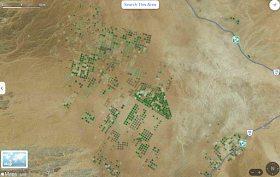One of the societies that Jared Diamond discusses in his book "Collapse..." are the Pre-Columbian Anasazi of Utah-Colorado-Arizona-New Mexico.
 |
Anasazi ruins
|
The Anasazi were (possibly) ancestors of the Hopi/Navaho puebolan Native-Americans. Or (possibly), they became extinct root-and-branch.
 |
Evidence from events like forest fires and sequences of dry-and-wet years makes it possible to determine over-lap or "shingling" of when the logs were living trees and to march back into time hundreds of years.
|
One random factoid that makes Anasazi fascinating to anthropologists (like catnip to cats) is that the brittle climate of the interior, American southwest made it possible to establish exquisitely precise timelines by virtue of the tree growth-rings of the beams used to support the roofs-and-floors of their multi-story dwellings. There is sufficient overlap as the communities grew, and sufficient "uniqueness" in the patterns that timelines can be projected backwards for 800 years with +/- 365 day precision.
Brittle climates
A useful visual metaphor for "brittle climates" is of a drunk who stumbles out of a bar looking for a place to relieve his bladder (because the single urinal in the pub is over-subscribed) and attempts to irrigate the base of a lamp-post.
His aim wobbles-and-weaves. Sometimes the base of the lamp-post is blessed with nearly all of the discharge. Other times, the base of the lamp-post only receives a nominal sprinkling.
If our drunk is a regular at the pup (perhaps his wife became strident over the money and time he spent there), it is possible likely that there will be evenings that he misses the lamp-post completely due to exceptional inebriation. There will be times that he passes-out just after stumbling out of the door and weeks or months might go by while our drunk is in rehab.
Due to the cycles-within-cycles-within-cycles, there can be long periods of favorable rainfalls when regions rapidly expand in population. A 3% annual rate of population growth translates to a doubling of population every 25 years. 200 years of uninterrupted good weather translates to 8 doublings in population or a 250X increase in population.
Other nerdy factors-in-play
As a "flat-lander" it is easy to get trapped into the thinking that access to resources is a function of R^2 where "R" is the distance that resources can be transported from. The implicit assumption is that resources (like solar energy) are evenly distributed and area of a circle "Pi * R^2" is a very good proxy for the resources that are available to harvest.
This rule-of-thumb is not written in stone. If we swam in the sea our baseline paradigm might be resources as a function of R^3 which scales with volume.
Anasazi culture was based on water flowing through arid regions: Small rivers and creeks and seep-springs. Their access to resources is linear, i.e. R^1 since moving very far from the flowing water meant you were standing in a desert.
For a flat-lander, the difference between walking 10 minutes and walking an hour increases the access to nominal resources by a factor of (60/10)^2 or by a factor of 36. For the riparian obligate Anasazi, it increased it by a factor of six. That is a big difference!
 |
Alluvial fan agriculture based on sub-surface moisture diffusing out beneath alluvial fan from erosion.
|
The people who depended on sub-surface water in alluvial fans at the bases of buttes and mesas for agriculture were even more limited. Not only were they hemmed in by the linear distribution of alluvial fans, the distance around the base of the mesa or butte was very finite.
How bad did it get?
In just a few short word-sketches:
A multi-generational span of exceptionally favorable wobbles of the climate led to gross population-overshoot.
All sizable trees suitable for construction within 15 miles (5 hour walk, one-way) of sizable settlements had been harvested.
Climate wobbled back to long-term averages (regression-to-the-mean). Food production crashed.
Study of coprolites (feces preserved by arid conditions or fossilized) uncovered human feces with entire rodent skeletons within. The archeologists speculate that people working in fields would catch mice that scurried away and swallow them whole...before they could be stolen by other workers.
I have never been THAT hungry.
But wait...there is more...
This is the point where our casual student moves on. The stark, implacable barrier of resource depletion. Case studies like the Anasazi are foundational to the Intellectual Left's visceral war on use of resources.
One of the major players that is NOT discussed in the case study (perhaps due to space constraints) is the role that technology plays in access to resources.
 |
Pico Island, Azores. Grapevines.
|
Something as simple as a ditch or an underground aqueduct to move irrigation water or putting a plant in a shallow basin (swales) with flat slabs of rock (or pavement) to direct rain runoff to the basin and the use of windbreaks to reduce evaporation losses are "technology". Tubing and pumps, drought resistant species, wheels, domesticated animals, bore-wells, wind and electric powered pumps...they are all "technology".
 |
Irrigated land, Saudi Arabia
|
It is not an exaggeration to claim that "technology creates resources". Consider coal. Before James Watt invented the valving that made steam-engines efficient, coal was an oddity. It was a very poor building material because it weathered rapidly and you did NOT want to build a chimney out of it. It was a stone that nobody had much use for. Evolving technology "created" a resource called "coal".
But then the depletion of forests and the vast increase in demand due to the shuttle-valve steam engine created a demand for coal...and it replaced sails and donkeys and horses...and freed up the land dedicated to growing cotton and flax and forage and oats...
There are limits to technology. But it is also undeniable that "technology" can blunt the brutal math of Malthus.




























.jpg)







